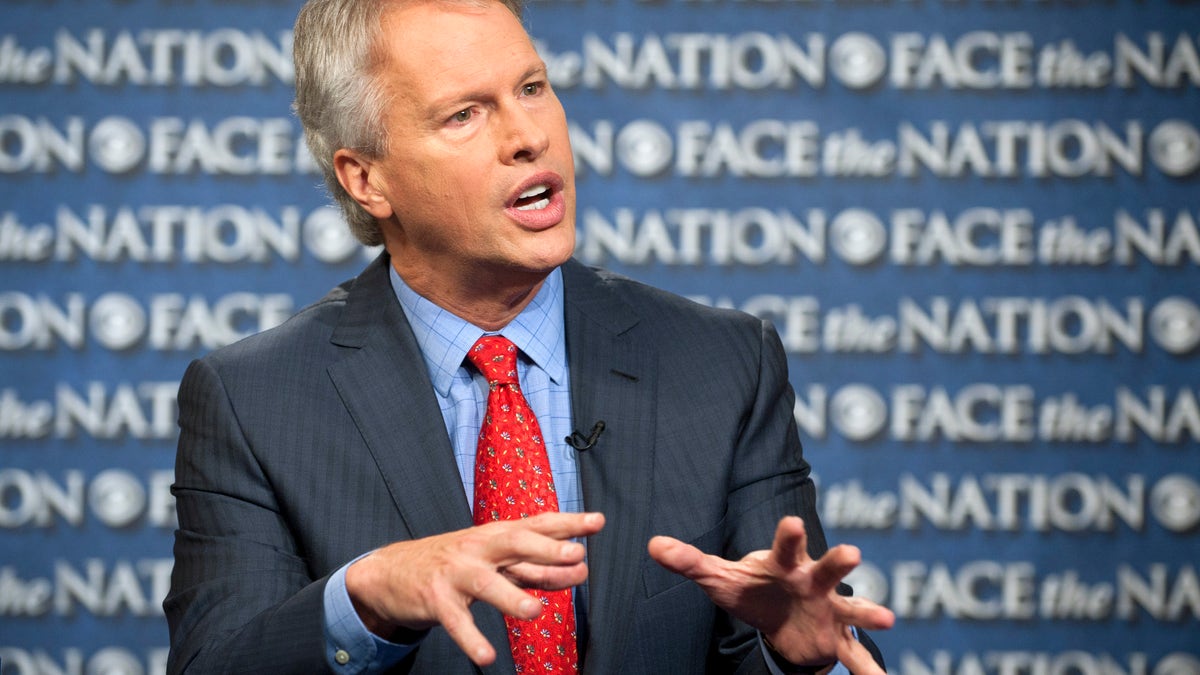
May 19, 2013: Gary Pruitt, the President and CEO of the Associated Press, discusses the leak investigation that led to his reporters' phone records being subpoenaed by the Justice Department on CBS's "Face the Nation" in Washington. (AP)
Associated Press President Gary Pruitt says the Justice Department sent a strong – and negative -- message to future sources that the government would go after them if they spoke to the press. It’s a move Pruitt called not only unconstitutional, but damaging to the ideal of a free press in the country in his first television interviews on the scandal Sunday.
In a separate interview with the AP, Pruitt said, "It's too early to know if we'll take legal action but I can tell you we are positively displeased and we do feel that our constitutional rights have been violated."
He said President Obama "should rein in that out-of-control investigation."
"They've been secretive, they've been overbroad and abusive -- so much so that taken together, they are unconstitutional because they violate our First Amendment rights," he added.
Although the Justice Department has not explained why it sought phone records from the AP, Pruitt pointed to a May 7, 2012, story that disclosed details of a successful CIA operation in Yemen to stop an airliner bomb plot around the one-year anniversary of the May 2, 2011, killing of Usama bin Laden.
The AP delayed publication of that story at the request of government officials who said it would jeopardize national security.
"We respected that, we acted responsibly, we held the story," Pruitt said.
Pruitt said the AP published the story only after officials from two government entities said the threat had passed. He said the administration still asked that the story be held until an official announcement the next day, a request the AP rejected.
The news service viewed the story as important because White House and Homeland Security Department officials were saying publicly there was no credible evidence of a terrorist threat to the U.S. around the one-year anniversary of bin Laden's death.
"So that was misleading to the American public. We felt the American public needed to know this story," Pruitt said.
The AP has seen an effect on its newsgathering since the disclosure of the Justice Department's subpoena, Pruitt said on CBS' "Face the Nation."
“It will hurt,” he said. “We’re already seeing some impact. Officials are saying they’re reluctant to talk.”
The Justice Department sought phone records for a two-month period from more than 20 phone lines in four bureaus, including Washington and New York.
"Their rules require them to come to us first," Pruitt said.
But the Justice Department maintains that telling the AP would have posed a threat to their investigation.
Last week, Attorney General Eric Holder faced aggressive questioning at a hearing by the GOP-led House Judiciary Committee amid the outcry over the gathering of phone records.
Holder said he had recused himself from the AP investigation and that it was Deputy Attorney General James Cole’s decision to authorize the subpoena. Holder had said he supported the decision and said that the department had seized the phone records in an effort to find out who leaked confidential information about a foiled terror attack in Yemen.
The DOJ went a step further and said the AP’s actions put Americans at risk, something the news organization strongly refuted.
“Rather than talk to us in advance, they seized these phone records in secret, saying that notifying us would compromise their investigation,” Pruitt said in a statement on the AP’s website.
Sen. John Cornyn, who was also on “Face The Nation,” called for Holder’s resignation. “I think it’s time for him to go,” he said.
The Associated Press contributed to this report




